- Home
- Rosamunde Pilcher
Sleeping Tiger Page 9
Sleeping Tiger Read online
Page 9
“If anyone’s going to sleep on a sofa, then it should be me.”
“Whichever you like. It’s all the same to me. I’m sorry that the Casa Barco isn’t more conveniently designed, but there’s little I can do about it now. I never imagined I’d have a daughter come to stay.”
“But I’m not your daughter.”
“Then let’s say you’re George Dyer Junior.”
7
Six years ago, when George Dyer had first come to live at Cala Fuerte, Juanita had presented herself at his door and announced, with great dignity, that she would like to work for him. She was the wife of a farmer from San Estaban, she had four children, who were at school in the village, and poverty was never far away. She needed the work, because she needed the money, but there was nothing in her erect and proud demeanour to give any hint of this. She was a small woman, with the square, toiling sturdiness of a working peasant, dark-eyed, short-legged, and with a smile of great charm only spoiled by the fact that she had never cleaned her teeth.
Each morning she was up at half past four, did the daily chores in her own house, fed her family and saw them off to work, and then walked down the hill from San Estaban to Cala Fuerte to present herself at the Casa Barco at half past seven. She cleaned and cooked for George, did the washing and the ironing, combed the cat and weeded the garden, and was not averse, if the need arose, to taking the dinghy out to Eclipse and scrubbing down her decks as well.
When Fiesta at Cala Fuerte was published, George gave her a complimentary copy, with a dedication written on the fly-leaf, “Juanita from George Dyer, with love and respect,” and it was perhaps her most precious possession, after the marriage bed which had been bequeathed to her by her grandmother, and the linen sheets, heavy as leather, which she had embroidered herself. She spoke no English and read in no language, but the book was already on show in her house, arranged, like an ornament, with a lace doily all to itself. She never let herself into his house. In Juanita’s code, this appeared to be a breach of etiquette. Instead, she would sit outside, on the wall, with her hands in her lap and her legs crossed at the ankle, like Royalty, and wait for him to come and open the door and let her in. He would say, “Buenos días, Juanita,” and they would exchange pleasantries about the weather, and she would ask how the Señor had slept. He had never discovered the reason for this strange shibboleth, and did not like to ask. Perhaps it had something to do with the fact that he did not have a wife.
The morning after the storm he awoke at seven. He had slept on the sofa, after all, because he hadn’t the heart to take the comfortable bed for himself. It was very quiet. The wind had died, and when he got up and went to open his shutters and go out on to the terrace, the morning was fresh and quiet as a pearl, without a cloud in the sky, and the world smelt damp and sweet after the rain, although the water of the harbour was murky from the rough weather, and a certain amount of devastation would have to be cleared away. To start with, he picked up his rickety terrace furniture from where it had been ignominiously blown, and tipped a puddle of water from the top of the table, and then he went back inside, and lit a cigarette, and thought that he would make a cup of tea. There was, however, no water in the kettle and he did not like to let the bucket down the well for fear of waking Selina.
He looked for his clothes, but the sweater and pants he had worn last night were unsuitable for the day’s work, so he went to the gallery to fetch himself some others. Selina still slept like a child, engulfed by George’s pyjamas and the enormous bed. Moving quietly, he took the first shirt and pair of pants that came to hand, and eased himself down the ladder again. He had a shower (the water was icy after the storm) and dressed, and then went to open the door for Juanita. She had not arrived, but if the door stood open, she would come in and start to cook his breakfast. Then he went back out on to the terrace, down the steps to the slipway, pushed out the dinghy and rowed out to Eclipse.
She seemed to have weathered the storm with her usual calm. He checked her mooring ropes, then went aboard. With a certain amount of forethought he had secured the tarpaulin cover over the cockpit, and although this sagged with pools of water, the cockpit itself was relatively dry. He loosened off a couple of straining halyards, and went below to make sure that his forward hatches had not let in any of the rain. Reassured, he returned to the cockpit, and perched himself on the coaming and lit a cigarette.
It was going to be a very warm day. Already steam was rising from the wet decks, and the tarpaulin, which he had spread out to dry. The air was so clear that he could see far inland, beyond the distant cross of San Estaban; and so quiet that when a fisherman, busy on his boat, talked in undertones to a companion, George could hear every word. There was only the slightest movement of water. The dinghy’s prow resisted this, with a soft lapping sound, but the yacht moved lightly, as though she were breathing.
Soothed by familiar surroundings, familiar smells and sounds, George felt himself begin to unwind. Calmly, now, he could consider the day ahead, and give a certain order to the problems which beset him.
The first was Rudolfo. He did not mind the row; it was not the first and it would not be the last, but Rudolfo was not a wealthy man, and somehow, and soon, the six hundred pesetas had to be paid back. George could not risk waiting until his own money was cleared by the bank in Barcelona. These delays had happened before, and he had once had to wait nearly a month before it came through. If, however, they sent a cable to Selina’s bank there was the possibility that the money would be in San Antonio in three or four days, and Rudolfo, knowing this, would be only too pleased to put her up at his hotel, and that way conventions would be respected, and no fine feelings, vulnerable in Cala Fuerte, would be offended.
On the other hand, there was Frances. Frances would lend him six hundred pesetas and Selina’s return air fair, if George could bring himself to ask her. But with Frances, money talked. And if he was going to get into her debt, he would not do it for Rudolfo, nor a girl who had come looking for her father, but on his own account, because only he would be able to settle the bill.
A movement from Casa Barco caught his eye, and he looked up and saw that Juanita was on the terrace, hanging the red-and-white blanket from the sofa over the washing line in order to air it. She wore a pink dress and a brown apron, and she went back into the house, only to reappear with a broom, and began to clear up the debris of last night’s broken flowerpots.
George wonderd how he was going to explain the presence of Selina in his bed. He had always been very careful never to let such a situation arise, and as far as Juanita was concerned, he had no idea how she might react. He did not like the thought of deceiving her, but on the other hand he did not want to lose her—for any reason. He could tell her the truth, but it was so far-fetched that he doubted whether the simple Juanita would swallow it. Or he could say that Selina was a visiting cousin, who had had to spend the night because of the storm. After some deliberation he decided that this was the best story, and had the added advantage of being more or less true. He tossed his cigarette overboard, let himself down into the dinghy and rowed gently back to Casa Barco.
Juanita was in the galley, boiling a kettle for his coffee
“Buenos días, Juanita.”
She turned, beaming.
“Buenos días, Señor.”
He decided to plunge straight in.
“Did you wake the Señorita when you drew the water from the well?”
“No, Señor, she still sleeps, like a baby.”
George glanced at Juanita sharply. Her voice was lyrical, her eyes shining with sentiment. This was not exactly what George had expected. He had not even had time to tell his story about the visiting cousin, and here was Juanita already looking all dewy-eyed … about what?
“You’ve … been up to see her then…?”
“Sí, Señor, I went to see if she was awake. But, Señor,” her voice dropped to a tone of mild reproach, “why did you never tell me that you had a daughter?”
George felt behind him for the arm of the sofa, and sat on it. “I never told you?” he said, stupidly.
“No, you have said no word about your daughter. And when Maria tells me, this morning, as I come through Cala Fuerte, that the Señor’s daughter is staying at the Casa Barco, I would not believe it. But it is true.”
George swallowed, and said, with forced calm, “Maria told you. And who told Maria?”
“Tomeu has told her.”
“Tomeu?”
“Sí, Señor. There was a taxi-driver who brought her here. He spent many hours in the bar of Rudolfo, and he told Rosita, who works there, that he had taken the daughter of Señor Dyer to the Casa Barco. Rosita told Tomeu when she went to buy some soap powder, and Tomeu told Maria, and Maria told Juanita.”
“And the rest of the village, I’ll be bound,” George muttered, in English, and silently cursed Selina.
“Señor?”
“It is nothing, Juanita.”
“Are you not pleased to have your daughter?”
“Yes, of course.”
“I did not know that the Señor had been married.”
George thought for a second and then said, “Her mother is dead.”
Juanita was devastated. “Señor, I did not know. And who has taken care of the Señorita?”
“Her grandmother,” said George, wondering how much longer he was going to get away from telling the truth. “Juanita, tell me … does Rudolfo know that … the Señorita is my daughter?”
“I have not seen Rudolfo, Señor.”
The kettle boiled, and she filled the earthenware jug that George had taught her to keep for coffee. The smell was delicious, but did nothing to cheer him. Juanita put the lid on the coffee-pot and said, “Señor, she is very beautiful.”
“Beautiful?” He sounded amazed, because he was.
“But of course she is beautiful.” Juanita carried his breakfast tray past him and out on to the terrace. “The Señor does not have to pretend with me.”
He ate his breakfast. An orange, a sweet ensamada, and as much coffee as the pot contained. Juanita moved about inside the house, soft-footed and making gentle sweeping sounds which indicated that she was cleaning. Presently she emerged with the round washing-basket, filled with clothes.
He said, “The Señorita got very wet last night, in the storm, and I told her to put her clothes on the floor of the bathroom.”
“Sí, Señor, I have found them.”
“Do them quickly as you can, Juanita. She has nothing else to wear.”
“Sí, Señor.”
She went past him and down the steps to her little cave of a wash-house, where she scrubbed sheets, socks and shirts impartially, boiling water in a great tub and using a bar of soap as large and as hard as a brick.
* * *
The first thing to do was go and see Rudolfo. As George went through the house, he glanced up at the gallery but there was no movement and not a sound. He cursed his visitor silently, but left her sleeping, and went out, and because he could not be bothered to open the garage doors and start up his car, began to walk to the village.
He was to regret this. For, before he had reached the Cala Fuerte Hotel, no fewer than seven people had congratulated him on having his daughter come to stay with him. As each encounter took place, George walked a little faster, as though on some errand of desperate urgency, giving the impression that much as he would like to stop and discuss this new and happy state of affairs, he simply did not have the time. Consequently he arrived at Rudolfo’s bar, out of breath and soaked in sweat, and feeling as if he had been caught in a trap. He stood in the curtained doorway, panting with exhaustion, and said, “Rudolfo. Am I allowed in?”
Rudolfo was behind the bar, polishing glasses. When he saw George, his hands were still. His smile began to spread. “George, my friend.” He laid down the glass and came out from behind the bar as if to embrace George.
George eyed him warily. “You’re not going to hit me?”
“It is you who should be hitting me. But I did not know. I was only told, this morning, by Rosita, that the Señorita is your daughter. Why did you not tell me last night? That she was your child. I did not even know that you had a child. And so beautiful…”
“Rudolfo, there’s been a mistake.…”
“And it was my mistake. And what kind of a man must you think I am, to grudge a favour to an old friend and his child?”
“But…”
Rudolfo raised a hand. “There can be no buts. Six hundred pesetas, well,” he shrugged, “it doesn’t grow on trees, but it will not ruin me.”
“Rudolfo…”
“My friend, if you say more I shall think that you have not forgiven me. Come, let us have a drink together—a cognac.…”
It was impossible. He refused to listen to the truth and George was not going to push it down his throat. He said weakly, “I’d rather have a coffee,” and Rudolfo went to shout for it and George hitched himself on to one of the bar stools and lit a cigarette. When Rudolfo returned he said, “You’ll get your money back. We can cable to London…”
“You will have to go to San Antonio to send a cable.”
“Well, fair enough. How long would you reckon it would take to come?”
Rudolfo shrugged hugely. “Two or three days. Maybe a week. It’s of no importance. I can wait a week for six hundred pesetas.”
“You’re a good man, Rudolfo.”
“But I get angry. You know I get angry.”
“You’re still a good man.”
The coffee came, brought by Rosita, the unconscious source of the trouble. George watched her set down the minuscule cups and told himself that he was deeper in deception than ever. And he realised, with a slight sinking of his heart, that there was now no need to ask his second favour of Rudolfo. If Selina was to be George’s daughter, there could be no point in her coming to live at the Cala Fuerte Hotel.
* * *
It was Pearl who woke Selina. She had been out all night, was tired from hunting and in need of a soft place to sleep. She came into the Casa Barco by way of the terrace, trod lightly up the stair to the gallery, and jumped, with scarcely a sound, on to the bed. Selina opened her eyes and looked straight into Pearl’s white, whiskered face. Pearl’s eyes were jade-green, the dark pupils mere slits of contentment. She trod the sheets for a little, making a nest, then fitted her boneless, furry body into the curve of Selina’s own and proceeded to go to sleep.
Selina rolled over and did the same thing.
The second time she was awakened more roughly. “Come on, now, it’s time to wake up. It’s eleven o’clock. Come on, now.” She was being shaken, and when she opened her eyes, George Dyer was sitting on the side of the bed. “It’s time you woke up,” he said again.
“Umm?” The cat was still there, deliciously heavy and warm. George, once focused, loomed enormous. He wore a blue cotton shirt and a grim expression, and Selina’s heart sank. She was never at her best first thing in the morning.
“It’s time you woke up.”
“What time is it?”
“I told you. Nearly eleven. I’ve got to talk to you.”
“Oh.” She pulled herself up and searched for pillows that had disappeared. George stooped to pick them up off the floor, and shoved them behind her. “Now, listen,” he said. “I’ve been to see Rudolfo…”
“Is he still angry?”
“No, he’s not angry. Not any more. You see, Rudolfo, and for that matter the entire village, believe that you really are my daughter. You know why they think that, don’t you? Because your drunken taxi-driver, damn his eyes, told them so.”
“Oh,” said Selina.
“Yes. Oh. Did you tell the taxi-driver I was your father.”
“Yes,” she admitted.
“For God’s sake why?”
“I had to, to make him bring me here. I said, ‘My father will pay the taxi fare,’ and that was the only thing that persuaded him.”
; “You had no right to do that. To involve an innocent party…”
“You?”
“Yes, me. I’m up to my neck in this now.”
“I never thought he would tell all the village.”
“He didn’t. He told Rosita, the girl who works in Rudolfo’s bar. And Rosita told Tomeu. And Tomeu told his mother. And Maria is the Official Receiving and Transmitting Station for this part of the island.”
“I see,” said Selina. “I am sorry. But can’t we tell them the truth?”
“Not now.”
“Why not now?”
“Because the people here…” he chose his words carefully, “have a very rigid standard of morals.”
“Then why did you let me stay last night?”
He was exasperated. “Because of the storm. Because of the row with Rudolfo. Because there wasn’t any alternative.”
“And you’ve said that I am your daughter?”
“I haven’t said that you’re not.”
“But you’re much too young. We worked it out last night.”
“No one else is to know that.”
“But it’s not true.”
“It wasn’t true when you told the taxi-driver.”
“Yes, but I didn’t know it wasn’t true!”
“And I do. Is that it? Well, I’m sorry if your principles are offended, but these people are my friends and I don’t want to disillusion them. Not that they have many illusions about me, but at least they don’t think I’m a liar.”
She still looked troubled, so he changed the subject. “Now, about this money. You say that we can cable to your bank…”
“Yes.”
“But not from Cala Fuerte. We have to go into San Antonio to send a cable. We can either send a wire directly to your bank, or it occurred to me on the way home, we might get in touch with your lawyer…”
“Oh, no,” said Selina, with such vehemence that George raised his eyebrows in surprise.
“Why not?”
“Let’s just cable the bank.”

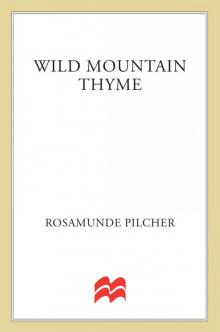 Wild Mountain Thyme
Wild Mountain Thyme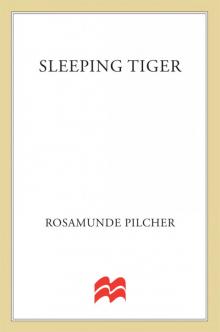 Sleeping Tiger
Sleeping Tiger Flowers in the Rain & Other Stories
Flowers in the Rain & Other Stories September
September The Blue Bedroom: & Other Stories
The Blue Bedroom: & Other Stories The Carousel
The Carousel The End of Summer
The End of Summer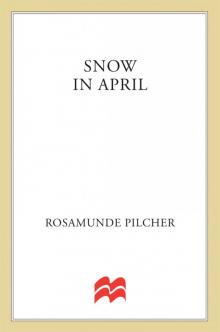 Snow in April
Snow in April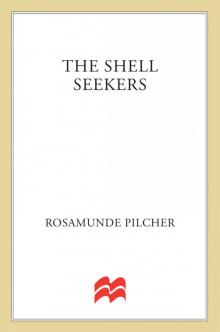 The Shell Seekers
The Shell Seekers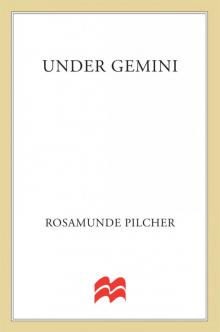 Under Gemini
Under Gemini The Empty House
The Empty House The Day of the Storm
The Day of the Storm Another View
Another View Voices in the Summer
Voices in the Summer The World of Rosamunde Pilcher
The World of Rosamunde Pilcher Voices In Summer
Voices In Summer Blue Bedroom and Other Stories
Blue Bedroom and Other Stories